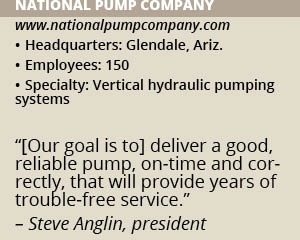National Pump Company
Leveraging its engineers’ knowledge and experience, National Pump Company has become an industry leader in designing reliable pump solutions.
National Pump Company manufactures vertical lineshaft turbine, submersible, jet and booster pumps for a multitude of various applications. For water systems applications, they include agriculture, municipal, industrial/commercial and residential applications. The company’s pumps can also serve in many other various applications, such as in the oil and gas, petrochemical, HVAC and snow-making markets as well as marine barge systems.
“We’re growing our product line to accommodate pipe diameters ranging from six to 30 inches,” President Steve Anglin says. “[Our goal is to] deliver a good, reliable pump, on-time and correctly, that will provide years of trouble-free service.”
In 2019, the company is celebrating 50 years in business, and National Pump Company shows no signs of slowing its progress. Part of the Gorman-Rupp family of companies, in addition to its Glendale, Ariz., headquarters, National Pump currently has facilities in Lubbock and Pasadena, Texas; Zolfo Springs, Fla.; Olive Branch, Miss.; and Fowler, Calif.
Water Systems
“Our pumps have been used in farm and golf course irrigation, mountain snow-making, as well as mine dewatering systems,” Anglin says. “In addition to off-the-shelf components, our design engineers can plan and test custom pumps for a variety of applications.”
The company’s water system projects range from smaller residential water pumps accommodating four-inch to eight-inch-diameter pipe to municipal systems implementing 30-inch-plus-diameter pipe that allow for flows of up to 25,000 gallons per minute. From fresh water supplies to waste water treatment to closed loop cooling systems, National Pump Company continually accommodates its clients’ changing needs and demands.
 One of the company’s biggest challenges is the advent of NSF-61 requirements for municipal well applications. Instituted by the National Sanitation Foundation (NSF), these are the public health and safety water standards for municipal water systems.
One of the company’s biggest challenges is the advent of NSF-61 requirements for municipal well applications. Instituted by the National Sanitation Foundation (NSF), these are the public health and safety water standards for municipal water systems.
“These standards call for everything that comes in contact with drinking water to comply with the requirements of the U.S. Safe Drinking Water Act,” Anglin says. To obtain certification, components must be tested by the NSF to ensure that no lead or chemicals leach into the water system.
“It took about a year and a significant expense [to National Pump Company], but we received the certification for our bowl assemblies last year and are working to get certification on the entire pump – top to bottom – now,” Anglin says. “We will be one of only three manufacturers that can provide a complete NSF-61-certified pump assembly.”
Oil and Gas Applications
Anglin says oil pumps are much more complex applications to deal with. Used for petroleum, petrochemical and natural gas industries, these systems are designed to meet the rigorous American Petroleum Institute (API) 610 standards. “These usually have sealed containment systems [to control leakage to the atmosphere] that have very exacting requirements,” he declares. “[Our pumps] accommodate butane, gasoline, light crude or other inflammable liquids.”
API 610 system considerations include the vibration level of the pump, the pipe metal thickness and assurance that all motors are explosion-proof. Additionally, such factors as using non-corrosive pipe materials and certain mechanical seals are also imperative to safe operation.
The National Pump Company API 610-compliant pump line includes the submersible VS0, wet pit VS1 and the canned booster VS6. Each of these versions can be customized to be made with various metal types including cast iron, bronze or stainless steel, duplex S/S, nickel/copper alloy bowls and/or carbon steel, chrome steel, K monel or 17-4 shafting.
The Glendale, Ariz., site also houses the company’s largest engineering test lab to measure both pump performance and NPSH (net positive suction head) testing. Due to the applications’ complexities, the delivery of these types of pump configurations can take 24 weeks or even up to a year from the project award date to shipment, Anglin says.
National Pump Company has installed systems for crude oil plants in Louisiana and Alberta, Canada; a gasoline blend transfer station in New Jersey; and a liquefied natural gas station in Chile.
“The engineering of our products must be very precise to make sure [the pump] is correctly assembled, tested and then delivered to the jobsite and provides sustained, reliable service,” Anglin asserts. National Pump Company says it strives “to be a leading fluid pumping solution provider in the global water and energy markets through collaboration and innovation.”